Commonwealth Games Redux: The Best of the Gold Coast
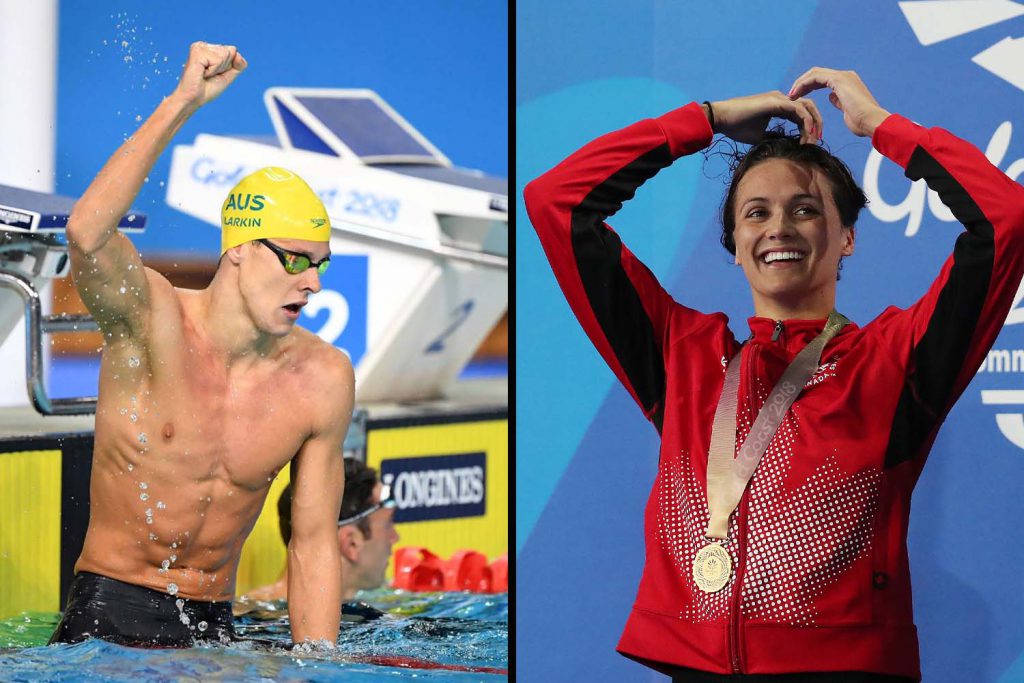
Editorial content for the Commonwealth Games coverage is sponsored by TritonWear. Visit TritonWear.com for more information on our sponsor. For full Swimming World coverage, check event coverage page.
By David Rieder.
Only one swimmer captured four individual gold medals at the Commonwealth Games. This swimmer was the class of one stroke, earning three narrow victories while dominating his signature event. After a massively disappointing meet at the 2017 World Championships, this swimmer was back where he expected to be, atop the podium.
He was the star of the Commonwealth Games: Mitch Larkin. Wait, what?
In terms of pure medal tally, that fact cannot be disputed. Larkin was the Commonwealth champion in all three backstroke events as well as the 200 IM. The 24-year-old won World titles in both the 100 and 200 back at the 2015 World Championships but slipped badly last year, finishing sixth in the 100 back, 15th in the 200 back and 18th in the 50 back.
At the Commonwealth meet, he had no peer—but it is worth noting that none of his winning times (24.68, 53.18 and 1:56.10 in the backstrokes, 1:57.67 in the 200 IM) would have been anywhere near good enough to win a medal at Worlds last summer. Finals, yes, but not medals.
But the best in the world will not swim together at one long course meet in 2018, so for Larkin and his Australian teammates, their missions for this year are swimming their best at Commonwealth Games and in August at the Pan Pacific Championships. Larkin ticked off one of those boxes this week. And hey, it’s always nice to win gold medals after a rough patch like his 2017.
One other man and four women joined Larkin as winners of multiple individual gold medals this week—but as you read about the others below, you’ll note that it was not exactly a perfect week for some of those on the list.
Cate Campbell
After sitting out the World Championships in 2017, Campbell returned to the international fray with three golds. She posted the fastest 100 free relay split in history with a 51.00 anchor leg on Australia’s world record-setting 4×100 free relay, she became the third-fastest performer in history with a 23.78 Commonwealth record in the 50 free, and she added a 50 fly title in her international debut in that race.
The one hiccup? The 100 free, where she faded down the stretch to finish in 52.69, more than a second and a half slower than her relay split and four tenths behind gold medalist and younger sister Bronte Campbell.
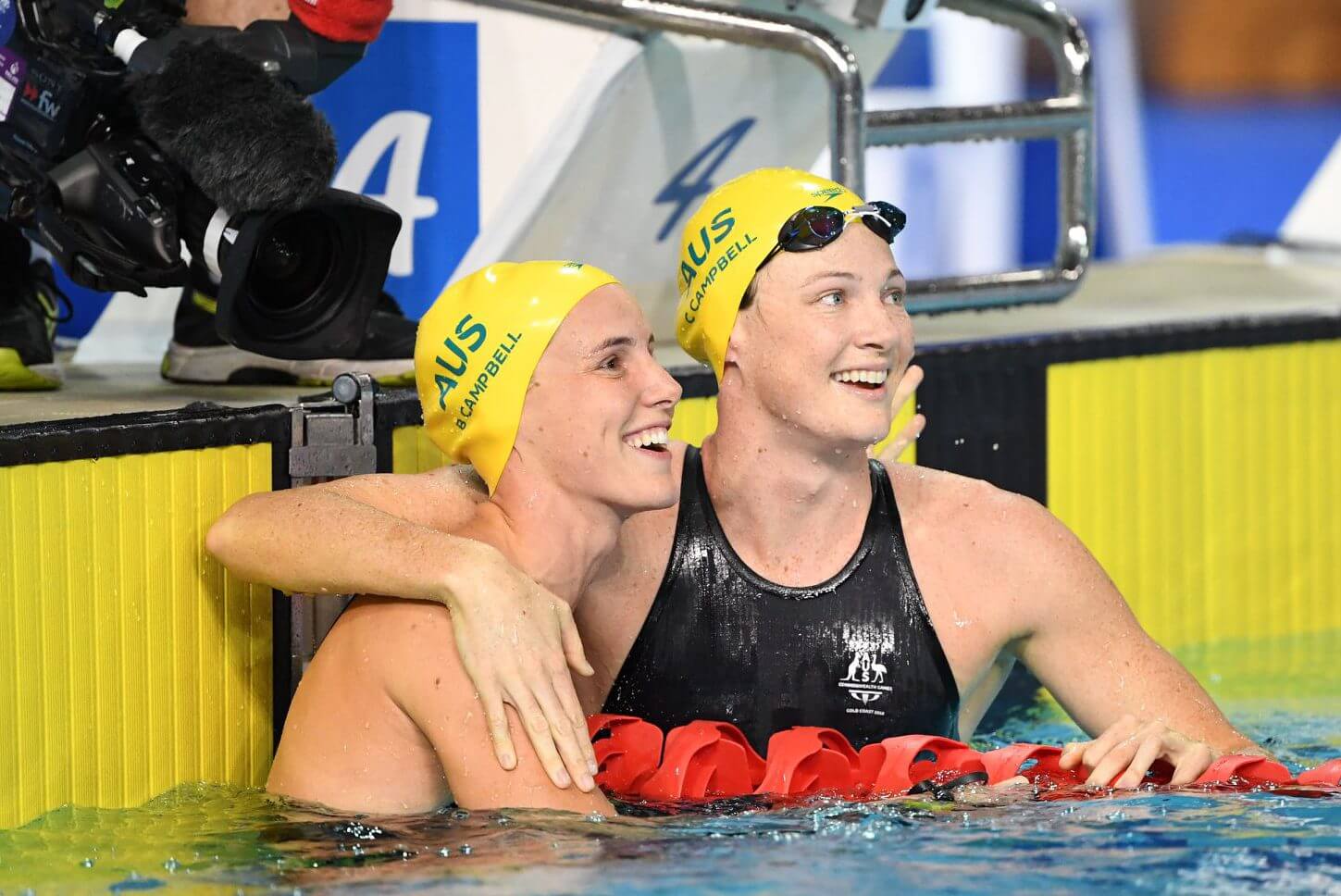
Bronte & Cate Campbell — Photo Courtesy: Delly Carr/Swimming Australia Ltd.
Bronte was the 2015 World Champion in the 100 free, and with her 52.27 in that race, a lifetime best, she showed incredible back-half speed and appeared to be racing healthy for the first time in three years. Yes, props to Bronte for an incredible race. But Cate seemed poised for better than that, perhaps even challenging to Sarah Sjostrom’s world record of 51.71. What happened?
We don’t know—only Cate does. It is worth noting that the 100 free came on day five of the meet, so Campbell was understandably fatigued by that point. But the loss was her second straight in a major 100 free final, after falling apart in the 2016 Olympic final in which she was heavily favored and finishing sixth.
To this eye, Sjostrom and Cate Campbell are the two best 100 freestylers in the world—but Sjostrom did not win the World Championship final and Campbell did not win the Commonwealth Games final. In swimming, so it goes.
Chad Le Clos
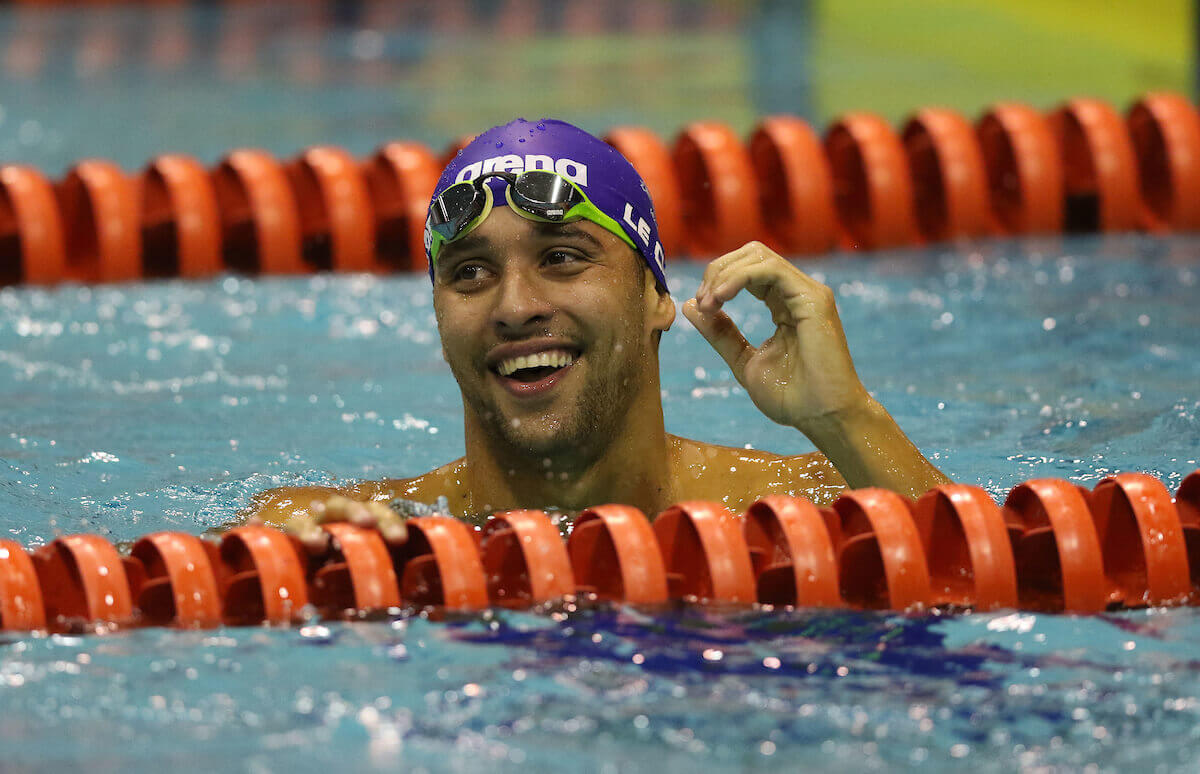
Chad Le Clos — Photo Courtesy: Anesh Debiky
The South African won five medals on the Gold Coast, bringing his career total of Commonwealth honors to 17. For the first time, he swept the butterfly races, and he also won his first international medal in the 100 free, tying for silver with Aussie Kyle Chalmers. In his final race, Le Clos split 50.10 on the fly leg of South Africa’s 4×100 medley relay, which earned bronze.
In typical Le Clos fashion, he attacked all his races from the start. It cost him in the 200 free, where he faded to seventh place, but that race came immediately after he stepped off the 50 fly awards podium. He faded in the 200 fly final as well, but he was so far ahead of the field that no one would catch him, even if his final time of 1:54.00 was a bit off his standard.
But in the 100s, he was sharp as ever. Le Clos’ 100 fly time of 50.65 was just a smidge off his best time, a 50.56 from the 2015 World Championships, and his 48.15 in the 100 free was a best time. With his 26th birthday approaching this week, is Le Clos shifting his focus away from the 200s and towards the shorter races?
Kylie Masse
In one of the week’s best races, Masse touched out Emily Seebohm to win the 100 back, 58.63 to 58.66. She added a win in the 200 back, putting up a strong time of 2:05.98, and she also took silvers in the 50 back (behind Seebohm) and the 4×100 medley relay (Canada finishing behind Australia).
There’s really not much more to add about Masse. Never a member of an “A” national team for Canada before two years ago, she’s established herself as the world’s premier 100 backstroker and pretty darn good in the 200 as well. No, she didn’t threaten her 100 back world record this week—as if she had something to prove in that event after her 58.10 last summer.
Tatjana Schoenmaker
If you didn’t expect to see Schoenmaker’s name on this list when the meet began, that’s understandable. If you are not familiar with her results from the 2016 Olympics or 2017 World Championships, also understandable—she wasn’t in attendance at either of those meets.
She’s 20 years old, and the Commonwealth Games marked her first major international meet. All she did was win the 100 breast in 1:06.41 and the 200 breast in 2:22.02. Both those marks would have been good enough to make finals at the 2017 World Champs, and the 200-meter time would have been good enough for fourth.
South Africa has had a ton of international swimming on the men’s side—think Le Clos and Cameron van der Burgh and before them, Roland Schoeman and Ryk Neethling—but not so much on the women’s side. According to Sport24, Schoenmaker’s gold was the first for an able-bodied South African female swimmer since the country was readmitted to the Commonwealth in 1994.
Ariarne Titmus
This 17-year-old Australian looks like a star. In her first Commonwealth Games, she captured golds in the 400 and 800 free and 4×200 free relay, along with a silver in the 400 free. And check these times: In the 200 free, 1:54.85—10th-fastest all-time. 400 free, 4:00.93, sixth-fastest. 800 free, 8:20.02, tied for 21st.
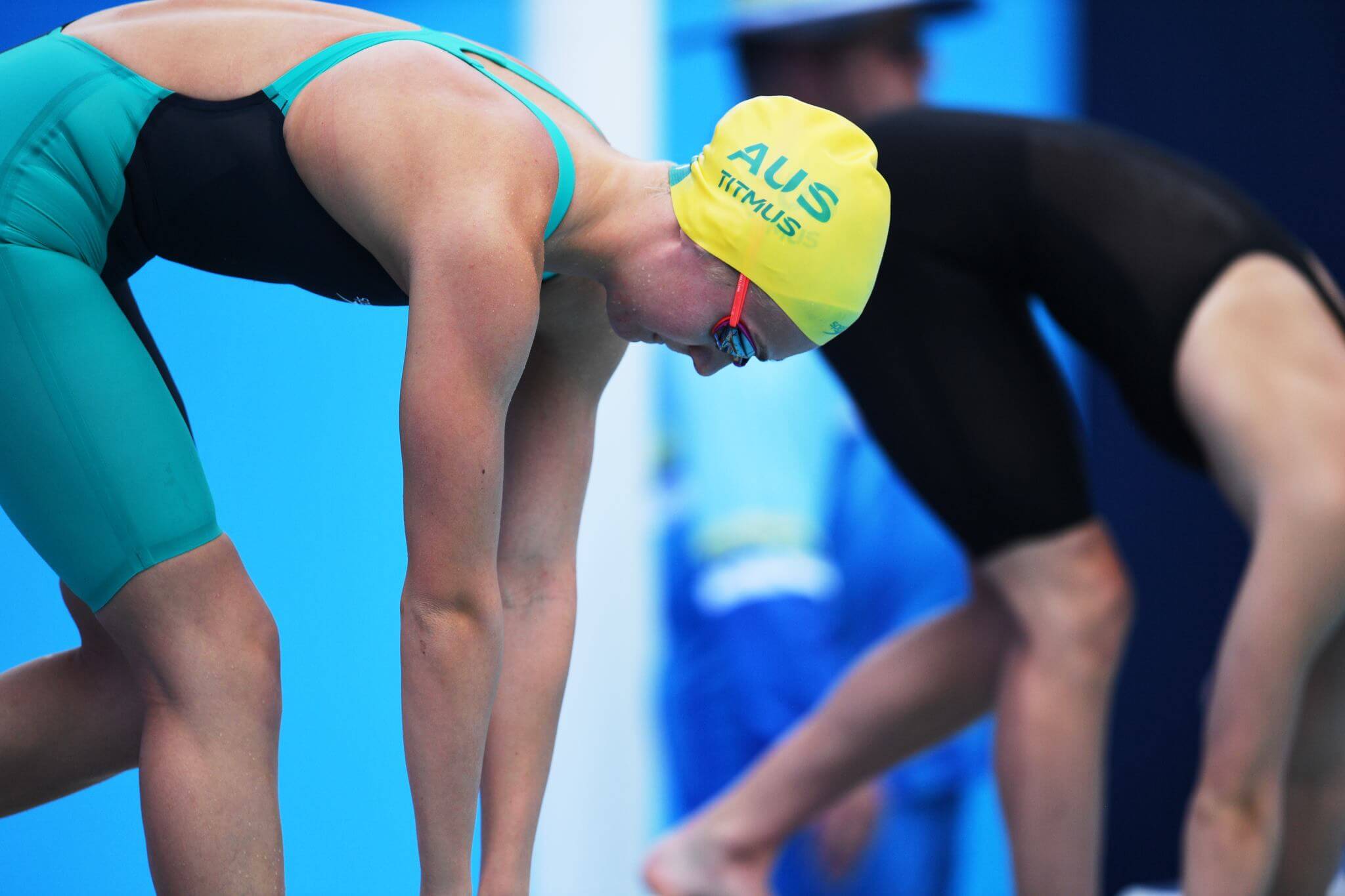
Ariarne Titmus — Photo Courtesy: Delly Carr/Swimming Australia Ltd.
And in that 400 free, Titmus is only the third woman to ever swim 4:00 or faster in a textile suit. The others? Americans Katie Ledecky and Leah Smith. Also worth noting: Her rate of improvement has been ridiculous. At the World Championships last July, Titmus was fourth in the 400 free at 4:04.26. Back then, it was her best time.
Yes, Titmus is still more than two seconds slower than Ledecky’s World title-winning time from last year, so she’s not on that level yet. But joining the sub-4:00 club seems like a matter of when, not if.
Quick Splashes:
*Almost 1300 words in and still no word on Taylor Ruck? Yeah, let’s change that. Per Swimming Canada, Ruck’s eight medals (gold in 200 free; silvers in 50 free, 200 back and all three relays; bronze in 100 free and 100 back) tie for the most medals won by a single athlete in Commonwealth Games history.
The others on that list are all swimmers, including Canada’s Ralph Hutton and Australia’s Susie O’Neill (1998) and Emily Seebohm (2010). Good company to be in.
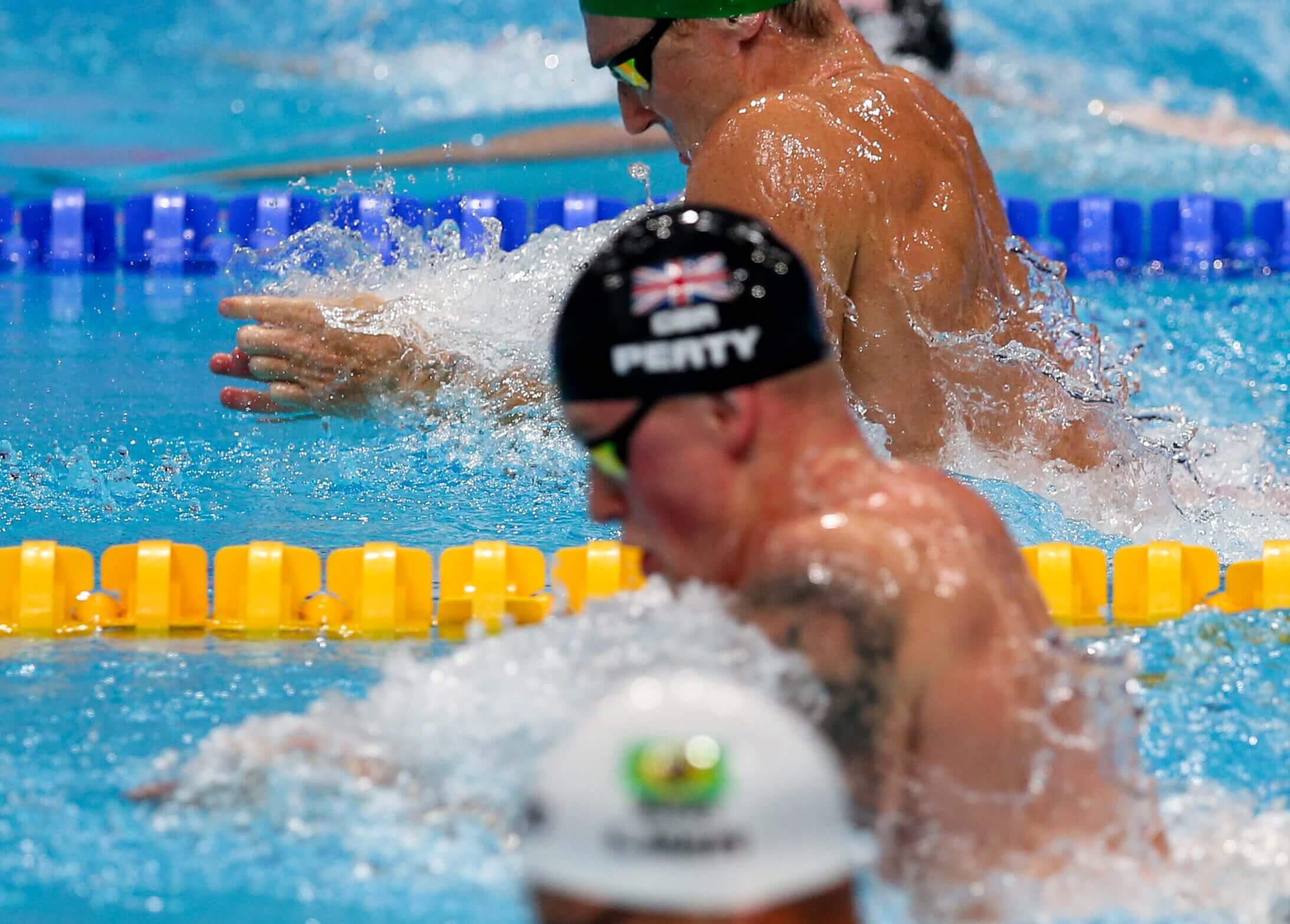
Adam Peaty — Photo Courtesy: SIPA USA
*Also not listed in the multiple-individual-gold category: Adam Peaty. He won gold in the 100 breast in 58.84 but settled for silver, four hundredths behind van der Burgh, in the 50 breast (26.58 to 26.62). The loss was Peaty’s first in the 50 breast since… he took silver behind van der Burgh at the last Commonwealth Games in 2014.
For the first time in a long time, Peaty had an off-week. His times were well off what he swam last summer at the World Championships (25.95 in the 50 breast and 57.47 in the 100 breast). But his best form is so far ahead of the rest of the world in sprint breaststroke that an “off-meet” will still net him an individual gold and a silver.
*On the last day of the meet, Australia’s Jack McLoughlin took gold in the 1500 free final in 14:47.09. That event is something of a national specialty Down Under, with legends like Kieran Perkins and Grant Hackett dominating the race for so many years. But since Hackett first retired in 2008, the Aussie distance tradition has suffered.
Before McLoughlin, no Australian had won a major title in the 1500 free since Hackett’s gold at the 2005 World Championships. McLoughlin also returned the Commonwealth title to Australia for the first time since 2002 (again, a Hackett gold).
*Duncan Scott first made a name for himself when he qualified for the 2016 Olympic final of the 100 free while only a teenager, becoming the first British man to break 48 in the process, but he showed some impressive versatility this week. Individually, he captured gold in the 100 free, silver in the 200 IM and bronzes in both the 200 free and 200 fly. He joined Larkin as the only men to win four individual medals.
Competing on Scotland’s relays, Scott won a pair of free relay bronze medals and anchored the medley relay to fourth with a 47.62 split. Meanwhile, Australia edged out England for gold by just nine hundredths. There’s no Team Great Britain at the Commonwealth Games, but if there was, a team Scott with usual relay-mates Peaty and James Guy would have been strong enough to take gold.





Para Swimmers????